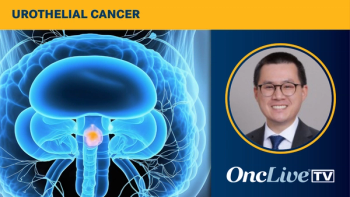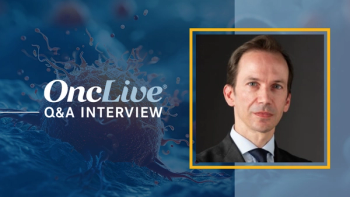
Metastatic Urothelial Carcinoma: Second-Line Therapy and Beyond
Expert perspectives on novel treatment approaches being investigated in the second-line setting of metastatic urothelial carcinoma and beyond.
Episodes in this series

Transcript:
Thomas Powles, MBBS, MRCP, MD: The good news is that the progress we’re making in urothelial cancer is rapid. This is terrific for our patients. We’ve seen the antibody-drug conjugate enfortumab vedotin have a survival advantage in patients whose cancers progressed after platinum-based chemotherapy and immune checkpoint inhibitors, including maintenance avelumab. From a global perspective, enfortumab vedotin is getting approved around the world by regulatory bodies. It’s already approved in the United States. Maintenance avelumab is associated with frontline chemotherapy, and then enfortumab vedotin becomes the new standard of care for patients, unselected as it stands with advanced urothelial cancer.
The FGFR [fibroblast growth factor receptor] inhibitor erdafitinib is licensed in the United States in patients with tumors with FGFR alterations. Screening those patients with FoundationOne or other forms of molecular analysis will be important in the future. The erdafitinib data are attractive. There’s a single-arm trial of 100 patients that stands. It’s less robust than EV-301, which is a large randomized phase 3 third-line trial of chemotherapy vs enfortumab vedotin in patients whose cancers have progressed after chemotherapy and immune checkpoint inhibitors.
There are options. We’ve got first-line chemotherapy, maintenance avelumab, antibody-drug conjugates [ADCs] with enfortumab vedotin, and single-arm data to support personalized therapy with FGFR inhibitors. I haven’t talked about sacituzumab govitecan, another antibody-drug conjugate that doesn’t have randomized data but also looks active. It’s fair to say that this field is moving very quickly. I haven’t mentioned ipilimumab and nivolumab; there are randomized data that we hope to see soon. I haven’t mentioned first-line pembrolizumab plus EV [enfortumab vedotin] in EV-302, which I’m excited about. That may change practice in the future as well. I haven’t talked about the NILE trial looking at chemotherapy, durvalumab, and tremelimumab.
There are many new things coming through in kidney cancer. We probably don’t have time to go through these in detail. But if I was lucky enough to be invited back next year, I hope the conversation would be very different then. This is a field that’s moving fast, and it’s important because the survival of these patients remains stubborn at 12 to 15 months. I hope enfortumab vedotin and maintenance avelumab are going to have a major effect on that. But we need to find new drugs with randomized data—erdafitinib, sacituzumab govitecan combinations, ADCs, and immune combinations for the future to continue to transform this disease.
Transcript edited for clarity.






































